Murad Abdul Jalil | Ali Darwish | Hebaa Shahada
Wearing a black hat while holding a pen and a notebook in his hand to register people’s needs, Abu Muhammad al-Joulani, leader of Hayat Tahrir al-sham (HTS) was seen inside one of the refugee camps in Idlib on 15 of the current month. Joulani’s appearance in the camp can be translated as an attempt to restore “public support” for his faction policies following chants and slogans against him, saying “there is no God but Allah, and Joulani is his enemy.”
Today, “HTS”, which represents the largest military force in Idlib, finds itself surrounded by many political, military, economic, and social challenges, amid the increasingly complex external and internal realities. All this urges the faction to look for solutions to prolong its existence and maintain its influence on regional affairs and the Syrian file as a whole.
Enab Baladi discusses in this file the status of this faction from three different angles: public support, economy, and ideology, and sheds light on the challenges and their impact on the HTS’ approaches and future courses.
Enab Baladi tried to contact the “HTS” to obtain a response on the information included in this file and ask about the faction’s ability to adapt itself to the current political and military situation. No one responded to inquiries by press time.
The people and “HTS”
Would mistrust topple the green flag?
Few hours after the U.S. designation of Jabhat al-Nusra (al-Nusra Front) as a “terrorist” group, on 10 December 2012, public protests took place throughout Syria chanting slogans “we are all al-Nusra” as a rejection to the American decision and to show support to a faction that won some of the major battles against the Syrian regime. However, and after seven years and a half, these chants are no longer the same echoed in an area control by the “HTS” (previously known as al-Nusra Front), in northwestern Syria, calling the faction to leave and accusing it of working against the interest of the people and the revolution.
Researcher, Abbas Sharifa, a specialist in jihadist Islamic groups, believes that as “al-Nusra Front” started to implement its project of founding its own emirate in 2015 through fighting other factions and establishing “the Salvation Government” (SG), tightening its grip on people’s livelihood, staging “fake” battles against the Syrian regime where “more than half of areas previously held by the opposition control were handed over” to the Syrian regime. Additionally, the HTS’s huge increase in grievances and judiciary corruption, along with its monopolization of the economy, raised “public discontent to finally be perceived by most Syrians as a parasitic organization seeking gains and control over resources at the expense of Syrian territories.”
Security caution amid fear of collapsing
Public demonstrations did not stop since 2011, where the same voices formally raised against the Syrian regime are now being raised against the HTS’s practices and its security restrictions through arresting and killing its opponents.
The Syrian Network for Human Rights (SNHR) has documented the killing of 25 people under torture in the “HTS’s prisons, along with launching more than 2,057 arbitrary arrests in the past nine years of the Syrian war. Moreover, the number of individuals forcibly disappeared has reached 1,946 since March 2011 and till August 2019.
In 2018, more than 20 masked men affiliated to the “HTS” headed towards lawyer Yasser al-Salim’s house in Kafr Nabl city, in the southern countryside of Idlib, to arrest him. Back then, they took him in the middle of the night with one of his guests, barefoot and blindfolded wearing his pajamas and put him in the back of a vehicle and drove him to the “punishment” prison, a cave located in a mountain between al-Bara, Baluon and Kansafra villages.
They accused him of adopting “a secular thinking that goes in contrast with Sharia law and religion”, after being held two months in a single cell of two meters long and one meter wide, where he spent 161 days of imprisonment until he was released on 1 March 2019, according to what lawyer al-Salim told Enab Baladi.
His arrest came as a result of expressing his opposing opinions to the HTS’s policies and sympathetic stances, through his Facebook account, with As-Suwayda, Kafriya and Al Fu’ah inhabitants and Kurds in their protests.
Al-Salim thinks that the latest popular revolt against the “HTS” in Idlib came as a result of “revealing its falsehood”, since what really matters for this faction is seizing power and obtaining financial gains as well as exerting repression similar to that of the Syrian regime, as he put it.
Lawyer al-Salim pointed out that the only good thing brought by the “HTS” was through its “members who believed the myth of jihad and sharia”, and who were feared by thieves and bandits since they were tough fighters on the front lines.
However, the faction tries “riding on the wave of the civil movement” as Abbas Sharifa put it into words, but “it fails every time”. He added that the “HTS” does not derive its legitimacy from the public’s choice, but through force and imposing control, hence it fears any popular movement and spares no effort in repressing it while fearing to collapse.”
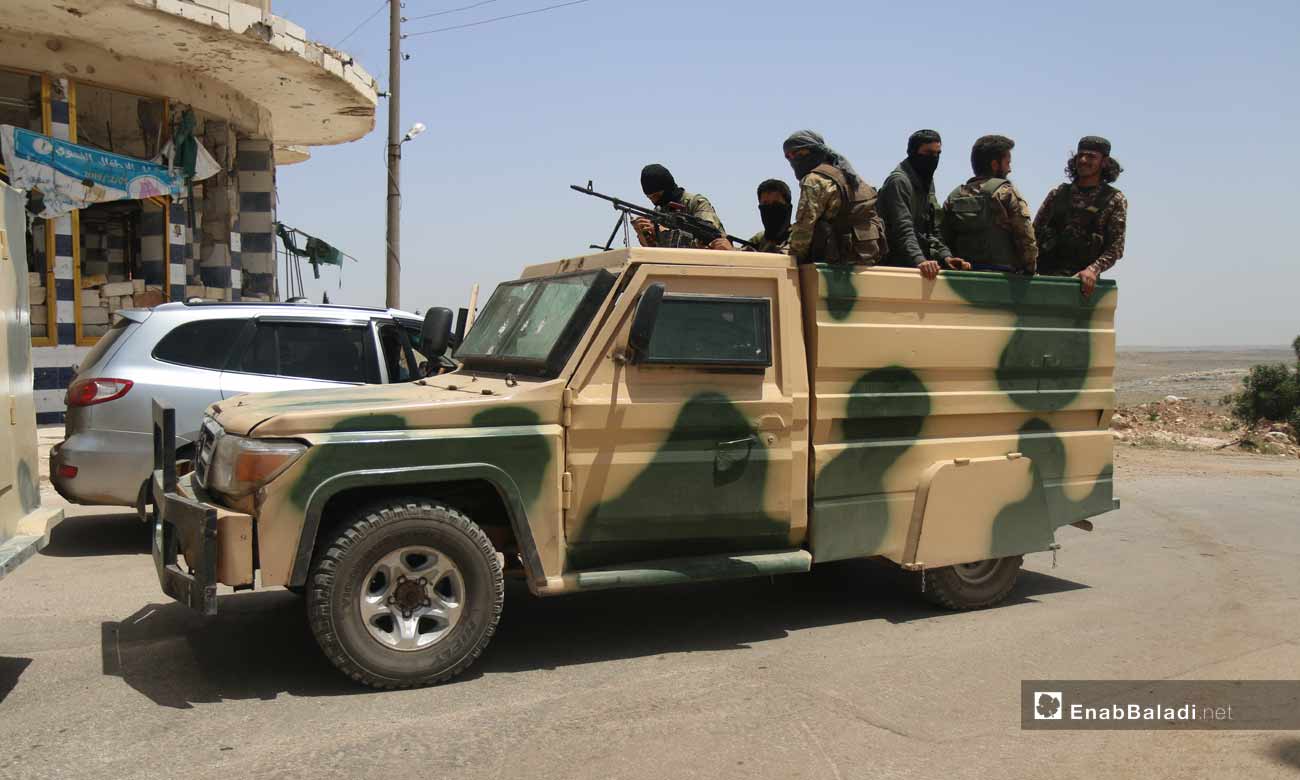
Members of Hayat Tahrir al-Sham (HTS) during prisoners’ exchange with the Syrian regime 16 May 2020 (Enab Baladi/ Youssef Gharibi)
Inside HTS…between objection and duty
Since “al-Nusra Front” started shifting, changing its official names every now and then and forming alliances with other factions, the number of defections increased either because of differences in approaches and views or different interests. In 2019, these defections reached the faction’s religious figures, separating those who reject “moderation” from those against “corruption”.
As for its members, whose numbers remain unknown, the way they responded to protesters refusing to open a crossing with the Syrian regime has a great impact on the faction’s reputation. Enab Baladi had contacted three members of the “HTS”, who preferred to remain anonymous for security considerations, and talked about the public refusal the faction is facing and the way this later is responding.
Muhammad (a nickname) is a young man, in his twenties, considers the way the “HTS” responded to demonstrators in Idlib wrong; he also expressed his reservation about its poor approaches while planning fights. Yet, his obligations as a fighter urge him to answer the faction’s calls in case of war, pointing out that his family is not happy about him being affiliated to the faction and that they urge him to leave it, based on what he told Enab Baladi.
Ahmed (also a nickname) expressed his reservations about the HTS’ financial transactions, pointing out that some of its princes “were tempted”. He thinks that refusing to benefit from their money spares him making mistakes while working under their command.
Omar (a nickname), on the other hand, who chose to leave the “HTS” three years ago, and joined the “Turkistan Islamic Party” group” (TIP) after what he saw as “tyranny of opinions and domination” especially when it comes to religion advocacy. He also talked about “corruption” and “cronyism” within the faction’s structure and what he called the “unjustified” fighting with the opposition factions. Speaking to Enab Baladi, Omar expressed his discontent about the HTS’s involvement with the regime economically while the corpses of its members are still unburied in its areas of control.
Public pressure…does it reach “HTS”?
The HTS’s opponents demand its dissolution in their demonstrations, based on what has been told to Enab Baladi by one of the protestors, who preferred to remain anonymous for security considerations.
In his opinion, the “HTS” did good to no one outside the regime-controlled areas, rather than being “a burden on these areas’ inhabitants” since it started embracing “different approaches” and sought financial gains and commercial projects.
Conditions will be much better in case of “the faction’s dissolution and the formation of a known civil administration elected by the people, while enhancing openness to other countries, considering that the region is under siege and it will remain this way for a long time.”
Inhabitants’ demands and demonstrations weaken the “HTS” and delegitimize it, such protests also enhance the state of public isolation the faction is currently facing, according to researcher Abbas Sharifa. However, the researcher thinks that all this “will not eradicate it”, being a military force that will not vanish or disappear without “a military action or without dissolving itself.”
The researcher doubted that dissolving the faction is among its leaders’ calculations due to what he called “complex system of interests” that links these leaderships to their fighters and their fear of shredding their league, consequently making them easily “targeted or held accountable for their previous crimes and thefts. Thus they need to preserve their strengths to protect themselves.”

A prisoner wearing the emblem of Hayat Tahrir al-Sham after handing him over to regime forces during prisoners’ exchange operation- 16 May 2020 (Enab Baladi/ Youssef Gharibi).
Spoils…Prisoners Exchange…Crossings
“HTS’s “economics financial means to secure its survival
While the “HTS” is trying to moderate its external rhetoric and promote itself as a moderate faction, its stances towards residents in the region were less flexible, leading to a number of casualties and injuries.
Such escalation was for the sake of opening a crossing to facilitate trade exchange with the regime during this month, under the pretext of “the general economic interest” despite fears of the coronavirus (COVID-19) spread.
To enhance this “economic interest”, the “HTS” depends on three different resources that were used differently throughout the various stages of its development.
The first resource was through donations and support, while the second was based on what is called seizure and inheritance of assets usually obtained during battles against the regime or other factions, and lastly, controlling trade in major commodities and crossings or trade entry points, according to what Khalid Tarkawi, an economic analyst, told Enab Baladi.
However, the HTS leader, Muhammad al-Joulani, said in an interview conducted by journalist Ahmed Mansour, on “Without Border” TV program on Al-Jazeera on May 2015, that his faction does not receive any support from intelligence entities or foreign countries, and that its financial resources are limited to “donations by common Muslims” and “war prizes” as well as some trade activities the faction has developed over the years to secure self-sufficiency.
War prizes of both the regime and opposition factions
War trophies obtained by the “HTS” were not limited to what the later seized from the regime but exceeded it in holding control over other opposition factions’ resources such as weapons, ammunition, and headquarters in case there were any.
Economic analyst Khalid Tarkawi thinks that the main reason behind the “HTS” interventions was to gain “empowerment”, a known concept in its jurisprudence, including economic and intellectual ones. This notion is based on the idea of “conquering” other forces and stipulates that the conqueror governs the area and imposes the status quo with the remaining forces submitting to his rule.
In July 2017, the “HTS” prevented forming new factions in the Syrian north, and attributed that to its “keenness to preserve the Syrian scene from fragmentations”. However, its current maneuvers today are justified as attempts to empower itself either through training, military preparation, or controlling bigger resources, according to Tarkawi.
In mid-2017, the “HTS” took control over “Ahrar al-Sham Movement’s” entire capabilities in mid-2017. A few months later, the faction seized “Nour al-Din al-Zenki Movement” headquarters and weapons in early 2018.
According to commander “Jaysh Omar”, Abu al-Abd Ashidaa, who criticized the rampant corruption through a video recording entitled “so the ship does not sink” issued on September 2019, the seized capabilities from “al-Zenki Movement” were estimated at 10 million USD (more than 1,100 vehicles and warehouses of ammunition and pharmaceutical products), “all treasured without even paying blood money as compensation for civilians killed by mistake.”
In 2014, the “HTS” also seized “Jaysh al-Sunna” ’s arms stores and car warehouses, in addition to other sums. In mid-2015, the faction took control over the capabilities of “Hazzm Movement”, “30th Division” and the “7th Brigade Special Forces”, along with other factions and small military blocs. The faction also secured some financial support through alliances with other factions within the frame of unifying efforts between the different forces.
Prisoners exchange… financing methods with undisclosed details
A number of famous prisoners exchanges were conducted between the “HTS” and different parties; however, the faction disclosed no details about these exchanges or the obtained sums in return, as was the case with March 2014 exchange where 13 nuns were freed after being held for more than three months in exchange for the release of 153 female detainees in the regime’s prisons, brokered by a Qatari-Lebanese mediation.
In November 2015, another exchange operation took place with the release of some Lebanese soldiers held earlier by the “HTS” in a battle with the Lebanese army in Arsal, a border town in eastern Lebanon, in exchange for freeing some “al-Nusra Front” captives from “Rumiya” prison by the Lebanese authorities.
The “four cities deal”, brokered by Qatar and signed in April 2017 between the “HTS” and “Ahrar al-Sham” and Iran, stipulates transferring inhabitants in Damascus Countryside mainly in towns of al-Zabadani and Madya to the north, along with “Yarmouk” camp, in exchange for emptying Kafriya and Al-Fu’ah towns through two stages and releasing 1,500 prisoners from the regime’s detention centers.
There were also a number of other exchanges that involved journalists, that the “HTS” is accused of kidnapping to release them later for ransoms. The “HTS” is also being accused of receiving money in exchange for handing over corpses of Iranian militias and the Lebanese “Hezbollah” members’, especially during the battles which took place in the countryside of Aleppo and Idlib.
Crossings and Trade…A non-stop funding around the clock
According to researcher Abbas Sharifa, a specialist in jihadist groups, the “HTS” has a huge complex economic network, that starts by controlling trade crossings such as “Bab al-Hawa” border-crossing with Turkey, “al-Ghazawiya” crossing, and “Deir Ballut” linking HTS-controlled areas in Idlib with the Turkish-backed “Free Syrian Army” (FSA) held ones. In addition, the HTS shares a number of crossings with the Syrian regime.
Crossings such as “Qalaat al-Mudiq”, “Abu Dali” and “Morek”, in the countryside of Hama, along with “al-Aiss” entry point, in the southern countryside of Aleppo, constitute the most prominent trade entry points previously controlled by the “HTS” before handing them over the regime forces. These crossings played a significant role into supplying the faction’s treasury with millions of dollars, according to Saleh al-Hamawi, a former leader in “Fateh al-Sham Front” (which later changed its name to “Tahrir al-Sham”), and the holder of a famous twitter account called “Basis of conflict in Levant”.
On 17 last April, al-Hamawi tweeted through his twitter account, that the HTS’s revenues from “Morek” crossing exceeded 800 thousand USD monthly, while its revenues from “al-Aiss”, “al-Mansoura”, “Qalaat al-Mudiq” and “Abu al-Duhur” entry points reached more than 2.5 million USD per month.
Meantime, prominent leader “Abu al-Abd Ashidaa” in the “HTS” said in a video intended to expose “corruption”, that his faction’s revenues are estimated at 130 million USD per month, pointing out that some of its leaders had a monopoly on importing most of the goods for the benefit of a specific group of traders which “raises costs on people.”
He added that despite its huge monthly income, the “HTS” fighters do not receive their monthly wages, leading most of them to leave their ranks because of extreme poverty. In the meantime, there are administrators whose salaries amount to more than USD 250 per month, even if they do not participate in fights or get bombed. Salaries of single fighters, on the other hand, amount to 20 thousand Syrian Pounds (USD 13 at an exchange rate of SYP 1,500 per one dollar), while married fighters are paid (USD 23 at the same exchange rate) along with a food basket.
At the beginning of its establishment, the “HTS” received more than 100 million USD, in addition to holding control over all resources in the “liberated areas” including crossings. Talking about money, their resources, and how to spend it inside the “HTS” is considered forbidden and a red line that should not be crossed by its members. According to “Abu al-Abed” the faction implemented a policy of austerity when it comes to “jihadists, sectors, armies, and brigades.”
Before his arrest, the leader wondered about the whereabouts of spending these assets, which the “HTS” claims expending on different fields, to discover later its falsehood.
Investments hurt people’s livelihood
The “HTS” also controls currency exchange agencies in Sarmada and Dana cities in the northern countryside of Idlib and jewelry stores. There are also a number of partnerships and speculations with traders in “liberated areas” in exchange for a percentage of their profits, in addition to transferring several investments abroad under unknown names.
Khaled Turkawi, an economic analyst, pointed out that the “HTS” started depending lately on small investments, as it opened some shops directly or through partnerships. Yet, it does not rely on them fully, being only a part of its future project.
The faction’s monopolistic investments had a negative impact on inhabitants’ livelihood in Idlib, including “Watad” fuel company and buying certain crops, according to what Abu al-Abd Ashidaa said previously in a tweet.
Enab Baladi learned that the “Salvation Government” (SG) accused of affiliation to the “HTS” despite its denial, imposes “night watch” taxes on some markets inside Idlib governorate, where some of these taxes amount to 10,000 SYP (USD 19.49) on every shop.
The HTS mandated itself to collect agricultural Zakat to distribute it to “the poor in liberated areas”. This raised tensions in Kafr Takharim, northern Idlib in November 2019, following demonstrations against the so-called “Zakat Collection Committee” (ZCC), as residents expelled these committees while trying to collect olive Zakat from olive presses.
HTS’s stages of development
Three different names…one man
Researcher, Hassan Abu Haniya, a specialist in Islamic movements’ affairs, told Enab Baladi, that “Abu Muhammad al-Joulani” is constantly trying to adapt with the changing circumstances through the use of pragmatism while dealing with the Syrian file developments. This can be proved through repeatedly changing the faction’s names from “al-Nusra Front” to “Fateh al-Sham Front” up to “Hayat Tahrir al-Sham”. Even though these names seem to have different links and affiliations, they remain under the leadership of the same man “Abu Muhammad al-Joulani”.
Since the establishment of “al-Nusra Front” in January 2012 in Syria, up to changing its name to “Hayat Tahrir al-Sham” in February 2017, the faction has undergone three different stages. The first stage was entitled “Jihad in Levant”, according to “al-Joulani” in an interview with “Al-Jazeera” TV channel in 2013. Back then, he said that “al-Nusra front is a product of global jihad and a long history of jihad in Egypt, Afghanistan, and Iraq”. Later, in 2015, he confirmed, in another interview with the same TV channel, that “Afghani jihad renewed the nation’s faith, and that its jihad extended to reach the Levant region.”
This phase was marked by disputes and conflicts between the faction and the so-called “Islamic State” (IS), with attempts to distance the former from “Abu Baker al-Baghdadi’s” approach, following their alliance from in 2013 and until February 2014. In 2013, “al-Joulani” reaffirmed his faction’s upholding to “al-Qaeda” approach when he said, “Our emir, Dr. Ayman al-Zawahiri, and all his commandments to meet with other factions, are the basics of jihadism, and al-Qaeda (…) and the wise guidance of its leadership goes in accordance with Quran and Sunnah and comes to enhance harmony and cohesion between Sunnah adherents.”
With “al-Nusra Front” strengthening its presence and its attempts to become “a spearhead in the Syrian arena and an essential factor that cannot be dispensed or marginalized”, based on what “al-Joulani” said in an interview with “Al-Jazeera” channel, more pressure was exerted on it locally and internationally, especially after being designated as a terrorist organization. All this urged “al-Joulani” to announce its disengagement from “al-Qaeda” in July 2016, along with the establishment of what was called back then “Fateh al-Sham Front”. The newly named faction operated for a whole year before changing its name again to “Hayat Tahrir al-Sham.”
The second phase was characterized by focusing on the local dimension through changing rhetoric and expanding influence in the Syrian north at various levels, whether military or in terms of security through extending influence over Idlib and the western countryside of Aleppo after defeating some of the “SFA” ’s factions namely, “Syrian Revolutionaries Front”, “Hazzm Movement”, “Nour al-Din Zenki Movement”, the “30th Division” and the “Union of Be Upright as Ordered”. At this stage, the faction also limited “Ahrar al-Sham” movements, its strongest former ally in “Jaish al-Fatah” (the Army of Conquest).
On the administrative and economic level, the HTS tightened its grip on areas under its control, established and supported the so-called “SG”, intervened in the work of local councils, and controlled all economic outlets in the region, mainly trade entry points or border crossings whether with Turkey or the Syrian regime, additionally to controlling the main road network.
Changing rhetoric …it is too late?
The last stage was different, as it was marked by “pragmatism” and the abandonment of “ideology” linked with “extremism”, which no longer serves the faction’s purposes amid the shifting circumstances. Thus, it was necessary for it to change its rhetoric and adopt a new policy that could secure its interests and survival in the long run, as an attempt to lead the future scene or even ensure its existence.
A statement entitled “Jihad and legitimate politics between certainties and changing variables” published by the “HTS” in June 2018, is considered a turning point in the faction’s rhetoric through the use of the term “significant interests” about its relations with other countries, followed by a number of “double rhetoric” statements as well as approving implicitly of the Turkish-Russian agreements concerning the region.
Yet, the most important discourse took place last February, during an interview conducted by “Crisis Group” website with al-Joulani, who pointed out that main goal of the “HTS” at the moment is to fight the regime that “has lost all legitimacy”, adding that the “HTS’s ideology today is based on Islamic jurisprudence, just like any other local Sunni group in Syria”.
During this interview, al-Joulani tries to send messages to other countries not to “use Syria as a launching pad for external operations, either by “al-Qaeda” or any other faction and focus instead on fighting the Syrian regime and its allies in Syria.”
Researcher Hassan Abu Haniya, a specialist in Islamic movements’ affairs, told Enab Baladi, that “al-Joulani’s” discourse was addressed to the United States, calling it to perceive the “HTS” as an opposing local group with legitimate aims.
Previously, the same group under the name of “Fateh al-Sham Front” confirmed in a statement published in 2016 that America “is an infidel enemy to Muslims, forbidden to deal with it under whatever excuse.”
According to Abu Hania, the last speech came late as “the group is actually a Salafi group governed by ideology from “al-Nusra Front”, to “Fateh al-Sham” till its current form “Tahrir al-Sham”, while trying to adapt itself with changes.” Abu Hania confirmed that “most radical movements when under pressure they make concessions and go back to the same authoritarian and strict rhetoric when they are not.”
Researcher, Abu Hania thinks that “al-Joulani” is trying to demonstrate its dominance and assert his power to represent himself as a local player—similar to Taliban (which signed an agreement with the U.S.) or “Jama’at Nasr al-Islam wal Muslimin in Mali” (JNIM) (as a local group)—consequently, taking part in future agreements, which certainly will not happen, since he is not strong enough to bring America to the negotiating table or even to be taken seriously by countries like Turkey or Russia,” as Hania put it.
Last January, U.S. special envoy to Syria, James Jeffrey, stated in a press conference that the “HTS is currently focusing on fighting the Syrian regime, and he did not see it generate international threats”. He added that “The HTS claims to be a patriotic opposition that includes fighters and not terrorists, but America has not accepted that claim yet.”
The faction’s discourse with Turkey, which is considered the main supporter of opposition factions and guarantor of the agreements with Russia, also changed. After the prohibition of fighting alongside it in the northern Aleppo countryside in 2016, “al-Joulani” considered the deployment of Turkish forces to Idlib in “the interest of the revolution”. During an interview, on 14 last February, he said that “we count on our internal strength while investing in any other opportunities which might be in the interest of the revolution.”
Previously, Turkey tried repeatedly to rehabilitate the “HTS” through merging it with the “National Front” and “moderating” its approach; however, all these attempts failed, according to Abu Hania, who considered that the “HTS is trying to manipulate all parties and take advantage of the situation in Idlib having the upper hand and the needed funds and infrastructure.
Limited options
According to Abu Hania, “things have reached a dead-end for the “HTS”, as there is no way out for the group, especially when being designated as a terrorist group by all parties including America, Russia, the United Nations (UN) and Turkey, whose patience seemed to have reached an end regarding the faction.
Following many reconstructing operations, rehabilitation, and integration efforts to moderate this faction, and amid the absence of a positive reaction, “al-Joulani’s” options are limited with only Turkey’s proposition on the table, according to researcher “Abu Hani”. Turkey has previously proposed merging the “HTS” with the Turkish-backed “FSA”, to protect Idlib and the whole region from Russian attacks under the pretext of fighting terrorism.
The researcher pointed out that things might remain the same in the meantime, in light of the world’s preoccupation with the novel coronavirus (COVID-19). Yet, some developments and military conflicts may take place. In case this happens, Turkey is fully aware that it will be a huge battle causing major losses in the ranks of civilians, which will prompt residents to displace what Turkey fears the most.
In case nothing changes, with the “HTS” refusing to merge with other factions, dissolved itself, or even adopt new approaches, there is no doubt that military action will take place sooner or later. Yet, there is time, and it seems that other parties are not in a hurry, which may urge “al-Joulani” to invest it, according to “Abu Hania”.
بعد استخدامها الرصاص ضد المتظاهرين وتزايد قوة “الجيش الوطني” والوجود التركي في إدلب.
كيف تجد مستقبل هيئة تحرير الشام في إدلب؟Posted by جريدة عنب بلدي Enab Baladi on Thursday, 14 May 2020
Youssef Gharibi, Enab Baladi’s correspondent, participated in the preparation of this file
if you think the article contain wrong information or you have additional details Send Correction
النسخة العربية من المقال
-
Follow us :












 Members of Hayat Tahrir al-Sham (HTS) during prisoners’ exchange with the Syrian regime 16 May 2020 (Enab Baladi/ Youssef Gharibi)
Members of Hayat Tahrir al-Sham (HTS) during prisoners’ exchange with the Syrian regime 16 May 2020 (Enab Baladi/ Youssef Gharibi)





 A
A
A
A
A
A
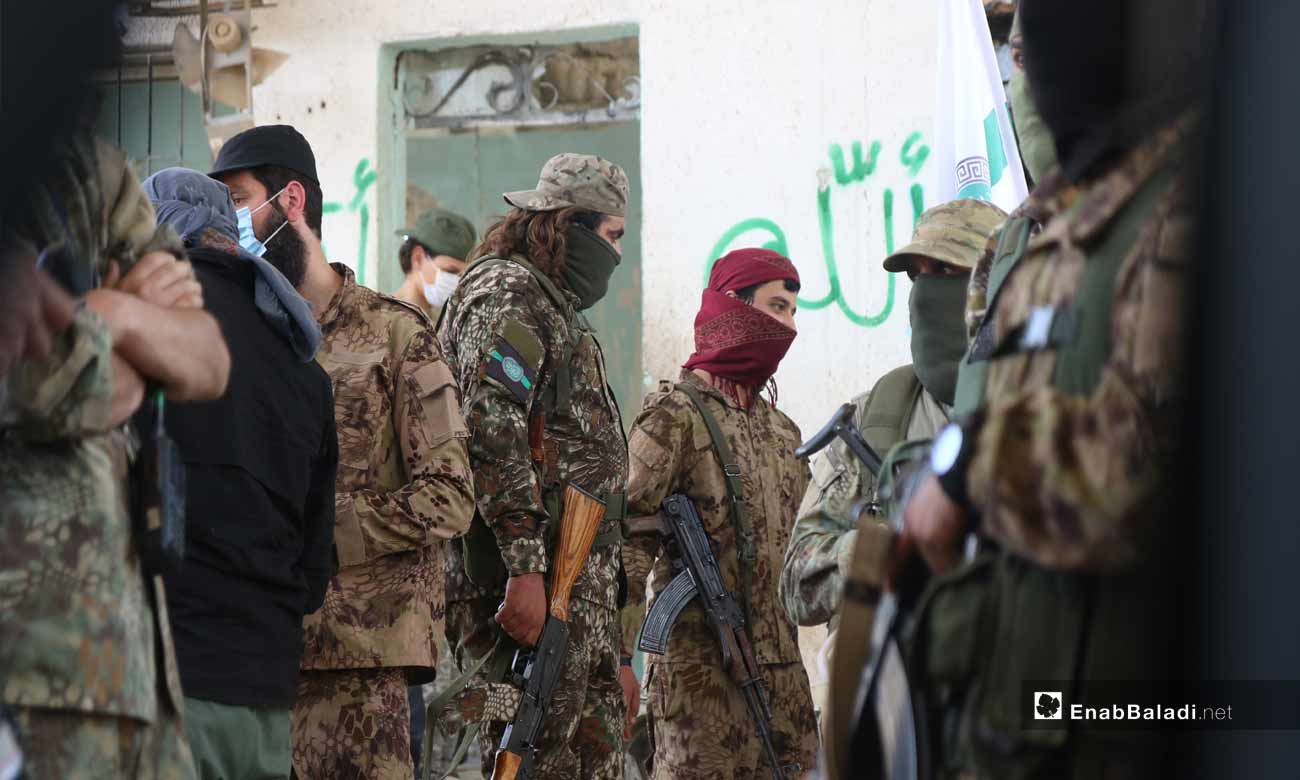
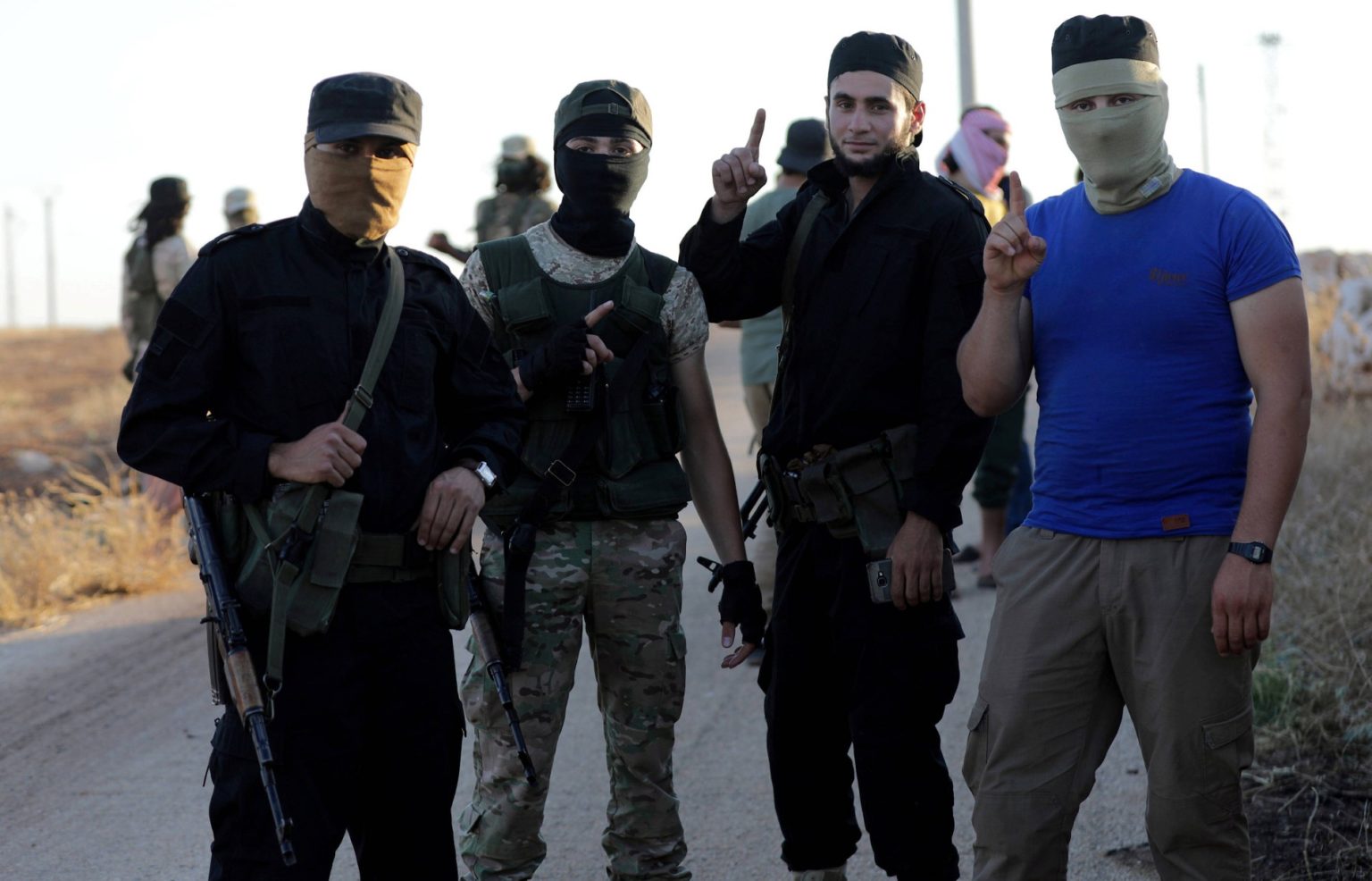

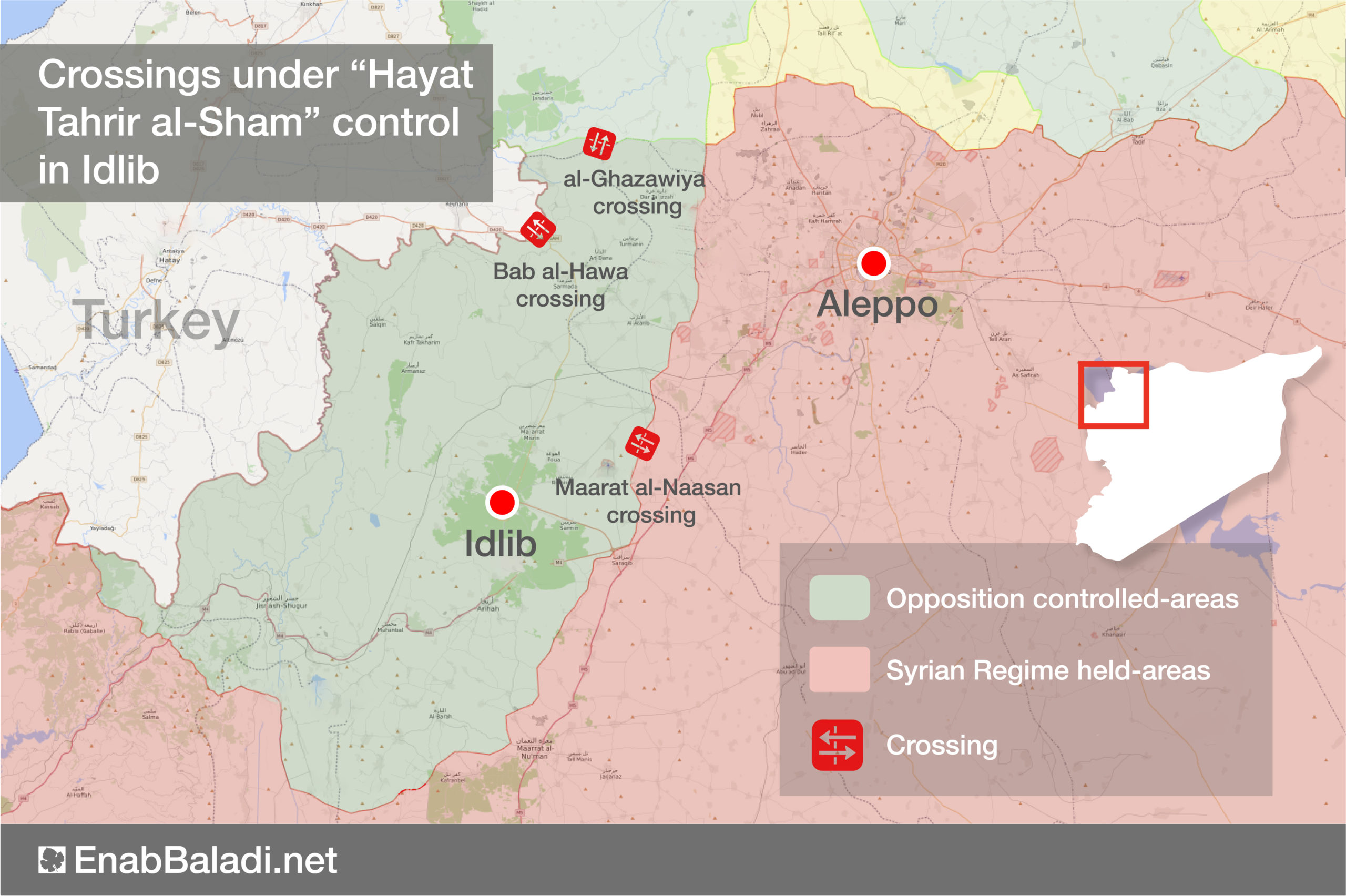
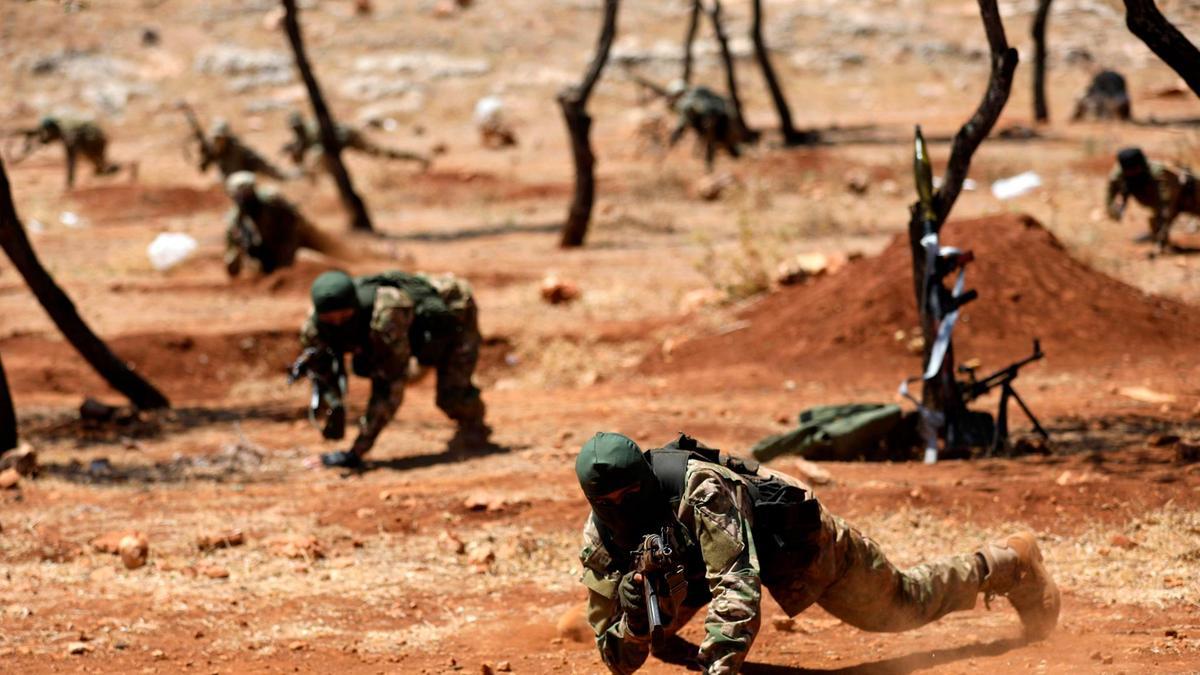







 More In-Depth
More In-Depth